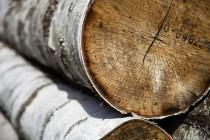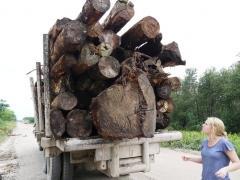
Through fraudulent permits and similar tactics, organized crime profits significantly from illegal logging.
By Bill Laurance, James Cook University
Illegal logging is booming, as criminal organisations tighten their grip on this profitable global industry. Hence, it comes just in the nick of time that Australia, after years of debate, is on the verge of passing an anti-logging bill.
Illegal logging is an international scourge, and increasingly an organised criminal activity. It robs developing nations of vital revenues while promoting corruption and murder. It takes a terrible toll on the environment, promoting deforestation, loss of biodiversity and harmful carbon emissions at alarming rates.
Moreover, the flood of illegal timber makes it much harder for legitimate timber producers. The vast majority of those in Australia and New Zealand have difficulty competing in domestic and international markets. That’s one reason that many major Aussie retail chains and brands, such as Bunnings, Ikea-Australia, Timber Queensland, and Kimberly-Clark, are supporting the anti-illegal logging bill.

Illegal logging denies governments of developing nations revenue worldwide. Bill Laurance.
Illegal logging thrives because it’s lucrative. A new report by Interpol and the United Nations Environment Programme, “Green Carbon, Black Trade”, estimates the economic value of illegal logging and wood processing to range from $30 billion to $100 billion annually. That’s a whopping figure — constituting some 10-30% of the global trade in wood products.
Illegal logging plagues some of the world’s poorest peoples, many of whom live in tropical timber-producing countries. According to a 2011 study by the World Bank, two-thirds of the world’s top tropical timber-producing nations are losing at least half of their timber to illegal loggers. In some developing countries the figure approaches 90%.
Many nations export large quantities of timber or wood products into Australia. These include Indonesia, Papua New Guinea and the Solomon Islands, all of which are suffering heavily from illegal logging. Many Chinese-made wood and paper imports also come from illegal timber. Indonesian President Susilo Bambang Yudhoyono has been pleading with timber-importing nations like Australia to help it combat illegal logging, which costs the nation billions of dollars annually in lost revenues.
The new Interpol report shows just how devious illegal loggers are becoming. It details more than 30 different ways in which organised criminal gangs stiff governments of revenues and launder their ill-gotten gains.
The variety of tactics used is dizzying. These tactics include falsifying logging permits and using bribery to obtain illegal logging permits, logging outside of timber concessions, hacking government websites to forge transportation permits, and laundering illegal timber by mixing it in with legal timber supplies.
The good news however, is that improving enforcement is slowly making things tougher for illegal loggers.
Accustomed to dealing with criminal enterprises that transcend international borders, Interpol is bringing a new level of sophistication to the war on illegal logging. This is timely because most current efforts to fight illegal logging – such as the European Union’s Forest Law and various timber eco-certification schemes – just aren’t designed to combat organised crime, corruption and money laundering.
The Interpol report urges a multi-pronged approach to fight illegal loggers. A key element of this is anti-logging legislation that makes it harder for timber-consuming nations and their companies to import ill-gotten timber and wood products.
The EU and USA both have active anti-illegal logging measures in place. And Australia looks set to join them with its Illegal Logging Prohibition Bill.
After years of rancorous debate, the Australian bill finally appears poised to be passed into law, despite a last-ditch effort by the conservative Liberal-National Party Coalition to scuttle it.

Australia’s much debated anti-illegal logging bill looks set to overcome longstanding hurdles soon. Bill Laurance.
This ill-conceived attempt was led by the Coalition’s deputy leader, Julie Bishop. What was striking about Bishop’s efforts was that she merely parroted the well-worn “free-trade-at-any-cost” arguments of former Australian trade ambassador Alan Oxley. Oxley is now a well-heeled lobbyist who defends the interests of the some of the world’s largest forest-destroying corporations. His efforts to sink the illegal logging bill are especially dubious because he steadfastly refuses to reveal who pays him.
Despite the efforts of Oxley and the conservative Coalition, Australia will soon join a growing league of timber-consuming nations that is taking direct action against the illegal logging syndicates.
It’s about time. With the help of Interpol and Australia’s forthcoming anti-logging bill, the world is slowly becoming a smaller place for timber criminals.
Bill Laurance receives funding from the Australian Research Council, the U.S. National Science Foundation and various other funding bodies. He is a Distinguished Professor and Australian Laureate at James Cook University and also holds the Prince Bernhard Chair in International Nature Conservation at Utrecht University, Netherlands. The Prince Bernhard Chair is co-funded by WWF-Netherlands, and allows Laurance to spend a month conducting research and environmental-education activities in Europe each year.
This article was originally published at The Conversation.
Read the original article.

